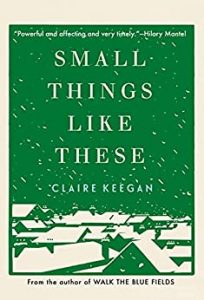
Discuss Furlong’s experience and the long-term impact this had on his character. Due to the generosity of his employer, he was one of few babies born to a person outside of wedlock who got to stay with his mother.

5) Furlong was born to an unmarried mother who died at 16. When his mother’s trouble became known, and her people made it clear that they’d have no more to do with her… (p. That’s precisely what Keegan does in this tender, condensed and pitch-perfect book.’ ‘It is impossible to change the past but essential to face up to it. There’s nothing preachy here, just the strange joy and anxiety of firmly resisting cruelty.’ ‘From the elements of this simple existence in an inconsequential town, Keegan has carved out a profoundly moving and universal story. ‘Keegan does something rare in creating archives of unhappiness, showing the way one sorrow may reverberate with another, how pressure can activate the pain of an old bruise.’ Through Furlong, it asks: “Why were the things that were closest so often the hardest to see?” And it prompts us to consider what responsibility we have to our neighbours.’ ‘This piercing book - which, at 116 pages, is the shortest novel to ever be in contention for the Booker Prize - examines the way awful suffering can unfold on our doorstep while we carry on with our privileged lives.

In one particular moment, when Furlong’s wife and daughters gather to ice the Christmas cake, Keegan’s writing approaches Proust.’ It is also a touching Christmas tale, genuinely reminiscent of the festive stories of O Henry and Charles Dickens a novel that has been seeped in sherry and served by the fireside.

‘The novel isn’t just an eloquent attack on the Magdalene laundries. Astonishingly, Keegan achieves this without ever sounding angry or preachy. It forces every reader to ask what they are doing about the injustices that we choose not to think about too closely. More than Furlong’s quiet heroism, it explores the silent, self-interested complicity of a whole community, which makes it possible for such cruelty to persist. The book is not so much about the nature of evil as the circumstances that allow it. We accompany Furlong, and we feel - and fear - for him as he realises what is happening, decides how he must in conscience act, and accepts what that action, in a small church-dominated town, will cost him, his wife and his children. It is the tale, simply told, of one ordinary middle-aged man - Bill Furlong - who in December 1985, in a small Irish town, slowly grasps the enormity of the local convent’s heartless treatment of unmarried mothers and their babies (one instance of what will soon be exposed as the scandal of the Magdalene laundries).

Keegan is measured and merciless as she dissects the silent acquiescence of a 1980s Irish town in the Church’s cruel treatment of unmarried mothers - and the cost of one man’s moral courage.


 0 kommentar(er)
0 kommentar(er)
